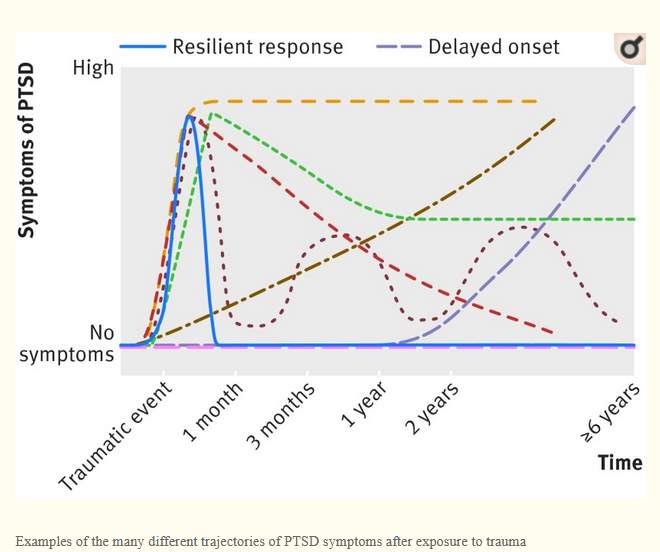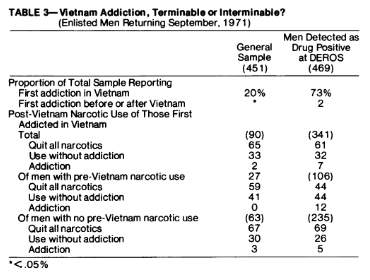How did the Media portray Vietnam Veterans and their PTSD and how did the Public treat these Veterans?
In this paper, the psychological trauma of the Vietnam war, public treatment of Vietnam veterans and how the media portrayed Vietnam veterans will be analysed through different sources such as examining the movies; Rambo: First Blood and Born on the Fourth of July.The first section will be research involving the psychological trauma of the Vietnam War on its veterans through studies and articles, going into the effects of PTSD, how most veterans had some form of substance abuse, how the war effected their family lives and how the public treated them. The second section will be examining how media portrayed Vietnam veterans, their PTSD and how the public treated them through film.
The Psychological Trauma of the Vietnam War
Through the nineteen-year period of the Vietnam War, fifty-eight thousand were killed, two thousand were captured and became Prisoners of War (POWs), over three-hundred thousand were wounded. Over 15% (480,000) of the 2.7 million (Defence Manpower Data Centre [DMDC] of the Office of the Secretary of Defence (2008) Americans who fought in the Vietnam War suffered from Post-Traumatic Stress Disorder (PTSD) from their service.
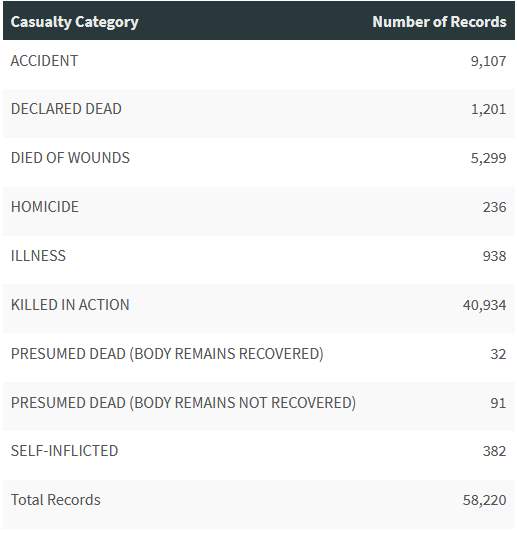
Image: Defence Manpower Data Centre [DMDC] of the Office of the Secretary of Defence (2008)
"It begins with an event in which the individual is threatened with his or her own death or the destruction of a body part, to such humiliation that their personal identity may be lost." [1]
PTSD is a mental health condition that may develop through exposure of a traumatic event. Sufferers of PTSD experience a variety of psychological symptoms; intrusive memories, changes in mood and cognition as well as aversion to reminders of the trauma. Not only does PTSD effect the patient mentally, it can also make the patient more likely to suffer from a physical illness and/or chronic disease such as gastrointestinal, cardiorespiratory and musculoskeletal disorders, with an increased risk of suicide. The rate of suicide for Vietnam veterans
Vietnam veterans who experienced PTSD have felt helpless, worthless, angry, depressed and demonstrate tendencies to go into survival tactics when reacting to tense situations. It was easy for the American government to ignore the effects of PTSD as some veterans didn’t experience any symptoms up until a year after they returned.
Often the most linked variable to PTSD is combat experience among veterans. The frequency of PTSD was higher with veterans who had large levels of exposure than ones who did not. Until the 1980s PTSD wasn’t seen as serious until countless Vietnam veterans complained of similar symptoms. Some psychologists believe that PTSD was common among Vietnam veterans because the veterans had a short ride home by themselves, not able to speak to anyone about what they went through unlike previous wars where soldiers were brought back on ships which took a longer time for them to get home and in turn, they were able to talk to their comrades about what they experienced.
How Media portrayed Public treatment of Vietnam Veterans through Rambo: First Blood
The media has produced many movies about the war’s humanity have been involved in. For the Vietnam War, movies such as; “Platoon”, “Deerhunter”, “Born on the Fourth of July”, “Forrest Gump” and “Rambo: First Blood” are based on the Vietnam War. These movies are films that are remembered by most people, so to get the best view of what the audiences saw portrayed about the Vietnam War in these films, it’s important to view films that have had an impact on society.
With Rambo: First Blood (1982), this movie portrays the repercussions of what the war does to its soldiers and how the public treats them. One of the pieces of media that I’ve picked is Rambo: First Blood which is based on the novel First Blood by David Morrell.
Rambo: First Blood is about a Vietnam Veteran named John Rambo (Sylvester Stallone) who travels through a small town of Hope, Washington. Immediately upon his arrival in Hope, he is met by the Sherriff of the town called William "Will" Teasle (Brian Manion Dennehy). When Rambo asks directions to the local diner, Teasle drives Rambo out of town and tells him not to come back. Rambo turns, going back towards the town and Teasle arrests him on the charges of vagrancy, resisting arrest and possessing a concealed weapon.
The awful treatment of Rambo doesn’t end though. Once he’s in the Police Station, Rambo is quiet barely speaking and that infuriates Chief Deputy Art Galt (Jack Starrett 1936-1989) who abuses Rambo; beating him with his baton, hosing him down with water and holding him down.
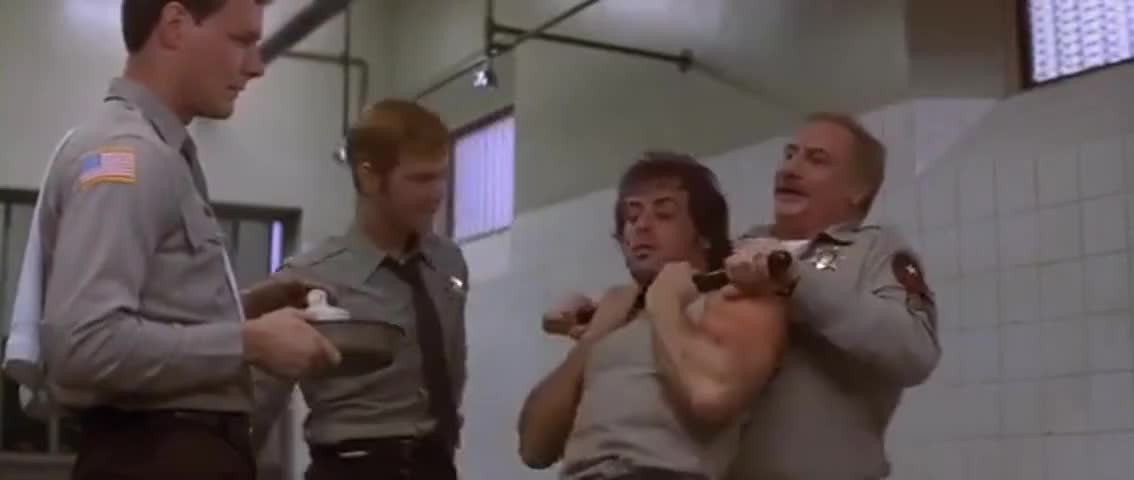
Kotcheff. Ted (Director) & Feitshans. Buzz. (Producer) (1982) Rambo: First Blood [Motion Picture]. United States: Orion Pictures. Image from Rambo: First Blood where Art Galt forcibly holding Rambo as another officer steps over with a shaving kit.
When the other officer steps over to Rambo, he is immediately stricken with flashbacks of the time where he was a Prisoner of War (POW) during the Vietnam War. Rambo overwhelms the patrolmen and fights his way outside of the station and into the woods. The police then search for him, using dogs, automatic weapons and a helicopter. When Galt sees him, he defies orders and shoots at Rambo from the helicopter. After injuring himself by leaping into a tree, he throws a rock that hits and fractures the helicopters windshield, causing Galt to fall out of the helicopter and die.
Even when Teasle finds out that Rambo is a former Green Beret and had received the Medal of Honour, he refuses to give up and is hell bent on hunting Rambo down. Rambo ends up injuring all of Teasle’s patrolmen but doesn’t kill them which surprises his former commanding officer Colonel Sam Trautman (Richard Crenna 1926-2003).
Throughout the movie, Rambo is in survival mode. Only until the end of the movie does the audience see how effected Rambo is from the Vietnam War. He has defeated Teasle but the entire station is surrounded by over two-hundred men with m-16s. Colonel Trautman tries to convince Rambo of surrendering when he sees Rambo start to rearm himself.
During this scene, Rambo breaks down and rambles about one of his comrades that had been killed in the Vietnam War by a bomb. Despite only showing the harsh reactions from the Sherriff and his officers, it still drives home partially how these men were treated when they returned from Vietnam and what they brought home with them.
“The box was wired, and he opened up the box, fucking blew his body all over the place. And he's laying there, and he's fuckin' screaming, there's pieces of him all over me, just......like this, and I'm tryin' to pull him off, you know, and i-- My friend that's all over me! I got blood and everything, and I'm tryin' to hold him together, I put him together, his fuckin' insides keep comin' out, and nobody would help! Nobody'd help, and he's sayin' "Hey, I wanna go home! I wanna go home!" He keeps calling my name! "I wanna go home, Johnny! I wanna drive my Chevy!" I said "With what?! I can't find your fuckin' legs! I can't find your legs!" [voice breaking] I can't get it out of my head. I've-- I've dreamed this seven years. Every day, I have this. And sometimes, I wake up, and I don't know where I am. I don't talk to anybody. Sometimes a day...a week... [about to cry] ...I can't put it out of my mind.” Kotcheff. Ted (Director) & Feitshans. Buzz. (Producer) (1982) Rambo: First Blood [Motion Picture]. United States: Orion Pictures.
Even though this is a film, it still shows how the Vietnam War effected its soldiers. When they came home after the war finished, there was no parades, no welcome home parties. In the eyes of the public soldiers were viewed as psychopathic killers who had no morals or control of their aggression. “Baby Killers” as Rambo called himself.
“Back there, I could fly a gunship. I could drive a tank. I was in charge of $1,000,000 equipment! Back here, I can't even hold a job parking cars!” Kotcheff. Ted (Director) & Feitshans. Buzz. (Producer) (1982) Rambo: First Blood [Motion Picture]. United States: Orion Pictures.
When they were put back into society, they had to try and establish a personal identity or a place in society because many soldiers would have lacked the job skills or education having been drafted straight out of school. Back in those days, there wasn’t any support systems or groups to help soldiers find their way which made them more isolated and feeling like they had been exploited for serving their country. With the substance abuse that many veterans went through to push away their horrible experiences from the Vietnam war, it added to the rejection from jobs. Not only that, it was hard for many veterans to readjust when they returned from continuous combat and guerrilla warfare to peaceful civilian society.
“Nothing is over! Nothing! You just don't turn it off! It wasn't my war! You asked me, I didn't ask you! And I did what I had to do to win, but somebody wouldn't let us win! And I come back to the world, and I see all those maggots at the airport, protestin' me, spittin', callin' me "Baby Killer!", and all kinds of vile crap! Who are they to protest me, huh?! Who are they, unless they been me and been there, and know what the Hell they're yellin' about?!” Kotcheff. Ted (Director) & Feitshans. Buzz. (Producer) (1982) Rambo: First Blood [Motion Picture]. United States: Orion Pictures.
The Vietnam War was and still is viewed as an unpopular war, that Vietnam veterans who fought in the Vietnam War couldn’t recall it with pride. Not only that, it was the first war to be reported in detail by the media through newspaper, photographs and radio. The media portrayed the soldiers in their own view, which caused the public to view them the same. The public didn’t realise what the soldiers were going through in the War due to the media building up a stereotype of the American soldier which were directed and formed by the military to build up morale. Instead of being this fearless and strong soldier that their family believed them to be, when the soldiers returned home, many were confused and had changed from the war, physically and mentally.
The influence media had on the Vietnam war was immense. The public were informed about the progress of the war through such things as television, newspapers, radios. Because of this, the public’s opinions and beliefs about the Vietnam war and its American soldiers were shaped from how the media viewed the war. Photographers were a big part of the Vietnam war and they were very influential in moulding public opinion. Depending on the photographer, they could either be interested in showing the suffering of the American soldiers or emphasize their strength and fearlessness.
People at home had no idea or experience of how the soldiers lived and what they dealt with during the war. So, American media built up a stereotype of the American soldier. The military had a lot of control over this depiction and for political reasons it was designed to build up morale at home or show production and potential progression of the war. After the soldiers returned home, they would be confused when they realise their family or friends didn’t understand what the soldier experienced and how it had affected them. What the public learned and discovered about the war was seen through the media. So, the media portrayal, is what the public believed even though it was a caricature divorced from the reality of the soldier’s experience. When returning home from their service and after building their personal identity, they then had to deal with criticisms and rejections from their society which caused many to struggle achieving such things as self-unity that would lead to PTSD.
How Media portrayed the impact of the Vietnam War through Born on the Fourth of July
Born on the Fourth of July (1989) is a movie based on the life of Ron Kovic directed by Oliver Stone. Born on the Fourth of July is the second instalment in a trilogy that starts with Platoon (1986) and finishes with Heaven & Earth (1993) that were also directed by Oliver Stone. Born on the Fourth of July is based on a book by Ron Kovic.
The film is about the life of Ron Kovic (Tom Cruise) over twenty years, detailing his childhood, military service and his paralysis that happened during the Vietnam War and his transition into anti-war activism. Born on the Fourth of July emphasizes how the main character Ron Kovic (Tom Cruise) wanted to serve his country, that he looked forward to defending and fighting for freedom. It could be said that that feeling would have been familiar with a lot of volunteers, that their patriotic freedom was part of the reason why they joined. Because by being a volunteer it was what the young American men saw as doing right and honourable, to fight for that freedom America believed in, instead of letting communism spread to Vietnam. Volunteering to fight in the Vietnam war meant the soldier was making not only their nation, but their family proud.
There are many reasons to why someone would participate in a war. A lot feel like it’s their duty to fight for their country. Other times majority of soldiers are drafted without a prior notice. Some avoided the draft and were able to remain home but either way soldiers were drafted or volunteered.
“Don't you know what it means to me to be a Marine, Dad? Ever since I was a kid, I've wanted this, I've wanted to serve my country, and I want to go. I want to go to Vietnam, and I'll die there if I have to.” Stone. Oliver (Director) & Kitman Ho. A. (Producer) (1989) Born on the Fourth of July [Motion Picture]. United States: Univeral Pictures
In the movie, Born on the Fourth of July, Ron Kovic psychologically struggles with the memories of killing a number of innocent Vietnamese villagers after mistaking them for the enemy as well as accidentally killing a young private named Wilson. Through showing this, it suggests that American soldiers obviously often made mistakes during battle with the veterans having to live with the consequences. With this, the substance abuse is shown after Kovic left the War, to come to terms with what happened to them.
Substance abuse played a large role in the Vietnam war. The Department of Defence reported that 51% of soldiers smoked marijuana, 28% consumed heroin and 31% had used other mind-altering drugs like psychedelics such as LSD.
Because such things as alcohol, marijuana and heroin were so abundant yet cheap, the American troops would use them to ease the stress of war and to forget what they had seen on the battlefield. When they had returned to the United States, these types of drugs were harder to obtain, affecting their marriages and families, so many stopped their substance abuse, but younger troops found it much more difficult to abstain. One of the effects of this situation was that men were refused employment because they had served in the Vietnam war and their potential employers saw this as plausible drug addiction. Many though refused to give up their substance abuse and with problems of trying to adjust back in society, they continued relying on drug or alcohol abuse to forget the horrors of Vietnam but also out of frustration for not being accepted.
In the movie, it shows the physical and psychological effects of the Vietnam War. Ron Kovic ends up paralyzed from a gunshot that hit his shoulder and lodged itself into his spine. With poor hospital conditions and the doctors using old equipment, Ron Kovic spent months trying to recover the use of his legs. In his attempts to be able to walk again using crutches, he ends up damaging his body to the point he must remain the rest of his life in a wheelchair. This causes his substance abuse to become worse due to him feeling neglected and disillusioned.
“It's my leg! I want my leg, you understand? Can't you understand that? All's I'm saying is that I want to be treated like a human being! I fought for my country! I am a Vietnam veteran! I fought for my country! And I think that I deserve to be treated... decent!” Stone. Oliver (Director) & Kitman Ho. A. (Producer) (1989) Born on the Fourth of July [Motion Picture]. United States: Univeral Pictures
Flashbacks occur vividly in Born of the Fourth of July and it reminds the soldier of the feelings of stress, confusion and frustration, affecting their lives and their families even though the War has ended. During a parade on Independence Day, Ron Kovic was asked to give a speech, but is unable to finish when he hears a baby crying, causing him to have a flashback of the abandoned baby from when his platoon killed the innocent villagers.
Eventually, Ron Kovic goes on to visit the family of the soldier who he killed accidently. He confesses his guilt, and the parents of the soldier are sympatric whereas the widow is not.
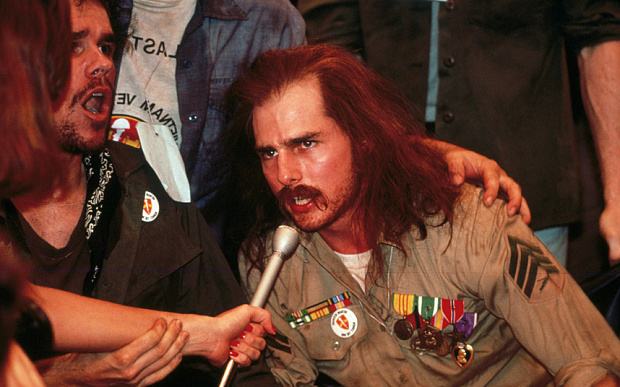
Stone. Oliver (Director) & Kitman Ho. A. (Producer) (1989) Born on the Fourth of July [Motion Picture]. United States: Univeral Pictures. Image: Ron Kovic in an interview at the Republican National Convention.
After this, Ron Kovic joins the Vietnam Veterans Against the War and travels to a convention in Miami, Florida for Richard Nixon, being a Republican National Convention. When there, he has an interview with a reporter, explaining how the government abandoned him and the American people and how the War should have never happened. Nixon supporters become furious, shoving this paraplegic veteran. In the end, the police attempt to remove him from the Convention. This scene easily shows how quickly and cruelly the public could turn on the veterans, spitting on someone who had gave their life to a war that many believe should have never happened. People nowadays still have a negative view towards veterans and what wars they have served.
“We're never, never gonna let the people of the United States forget that war, because the moment we do, there's gonna be another war, and another, and another. That's why we're gonna be there for the rest of our lives telling you that the war happened - it wasn't just some nightmare - it happened, and you're not gonna sweep it under the rug…” Stone. Oliver (Director) & Kitman Ho. A. (Producer) (1989) Born on the Fourth of July [Motion Picture]. United States: Univeral Pictures
After the Vietnam war, there had been a feeling of hostility from veterans towards groups like anti-war protesters, family, friends and the government. They were forgotten by their own government and the thousands of soldiers who developed PTSD were swept under the rug because of the delayed stress reaction from PTSD, so many didn’t develop until a year after being discharged. Due to this, and the one-year time limit that the Veteran’s Administration had in place, many veterans weren’t given help or disability compensation when they needed it, causing depression and behavioural problems.
Veterans were victims because they had given everything, physically, emotionally and psychologically for their country and got nothing back in return. It caused them to feel used and spiteful especially towards the government. It was common for veterans to feel hatred and hostility towards their government who had allowed them to die while the veterans alive were forgotten.
Conclusion
In conclusion, this paper goes into how Vietnam veterans were treated by the public and portrayed within film. Through research we see how the soldiers were affected, taking various substances in order to block out the traumatic events during the war and how they carried that substance abuse home with them, effecting their family life.
Also, during the time of the War, the media was heavily biased and the same goes for the films. The films portrayed characters and events that were interesting, but also helped attract large audiences and profit. Not just that, the film will be biased due to the director’s own point of view on how to portray these characters and the Vietnam War. So, in some cases the films traded an accuracy for a more climatic ending. By the studios trying to make a profit, they left out the soldier’s reluctance to go into battle the closer it got to them leaving at the end of their tour.
For Rambo: First Blood, we see the effects the war had on the main character and how reluctant he was to fight again but went into survival mode when he was triggered by his PTSD flashbacks. There was an effort to be respectful with how Rambo and his PTSD was portrayed but they still pulled punches, wanting to make it more action based. Only until the end, do we hear Rambo speak more than he has throughout the entire film and it’s about his trauma.
For Born on the Fourth of July, we see how the physical and psychological effects of the war have on the main character, how he becomes paralyzed and regretful of the innocent killings and in the end becomes an anti-war advocate. Both films were widely received by the public and both became influential films. Rambo: First Blood became influential within the action genre and Tom Cruise’s portrayal of Ron Kovic in Born on the Fourth of July had been so well received that he had nominated for an Academy Award.
Through the use of film, the viewer can see some truths to what really happened in the Vietnam war, the trauma the veterans went through and the rejection they faced when returning home from the public, their own family and friends and from the government. Despite all of this, there are still thousands of veterans out there who are suffering from PTSD still to this very day.
References:
- Reisman. Miriam. “PTSD Treatment for Veterans: What’s Working, What’s New, and What’s Next” National Library of Medicine. 2016 Oct; 41(10): 623-627, 632-634.
- C McLeay. Sarah et al. “Physical comorbidities of post-traumatic stress disorder in Australian Vietnam War veterans” Medical Journal of Australia. Med J Aust 2017; 206 (6): 251-257.
- Howell-Koehler, Nancy. "Vietnam: The Battle comes home." New Trauma of War: Stress and Recovery in Vietnam Veterans. Washington, D.C.: American Psychiatric Press, Inc., 1985.
- Laufer, Robert S. et al. "War stress and trauma: The Vietnam veteran experience." Journal of Health and Social Behaviour. 1984 Mar Vol 25(l) 65-85.
- Thompson, Kenrick. "Photographic imagery and the Vietnam War: an unexamined perspective" JOURNAL OF PSYCHOLOGY. 1974 Jul vol.8(2) 279-292
- Parson, Erwin Randolph. "Post-traumatic self-disorders: Theoretical and practical considerations in psychotherapy of Vietnam War veterans." HUMAN ADAPTION TO EXTREME STRESS: FROM THE HOLOCAUST TO VIETNAM. 1998 245-283.
- McFarlane. Alexander C. “The impact of war on mental health: lest we forgot.” World Psychiatry. 2015 Oct; 14(3): 351–353.
- Dennis. Paul A. et al. “Moral Transgression during the Vietnam War: A Path Analysis of the Psychological Impact of Veterans’ involvement in Wartime Atrocities.” Anxiety Stress Coping. 2017 Mar; 30(2): 188–201.
- Corry. Nida, H. et al. “Forty Years After the War: How are Vietnam Veterans Doing Today?” National Centre for PTSD. VOLUME 27/NO. 1 ISSN: 1050-1835 • 2016
- Heerwig. Jennifer A. Conley. Dalton. “The casual effects of Vietnam-era military service on post-war family dynamics.” Social Science Research 42 (2013) 299–31
[1] Howell-Koehler, Nancy. "Vietnam: The Battle comes home." New Trauma of War: Stress and Recovery in Vietnam Veterans. (Washington, D.C.: American Psychiatric Press, Inc., 1985), p. 147.
[2] Bisson. Jonathan et al. “Post-Traumatic Stress Disorder” BMJ. 2015; 351: h6161
[3] Robins, Lee. Davis, Darlene. Nurco, David. “How Permanent Was Vietnam Drug Addiction?”
Cite This Work
To export a reference to this article please select a referencing style below:
Related Content
All TagsContent relating to: "ptsd"
Symptoms of PTSD include frequent, spontaneous, flashbacks, disturbing upsetting recollections, and dreams of the traumatic event. PTSD brings along consequences that cause distress in social, occupational, or any other areas of functioning.
Related Articles


